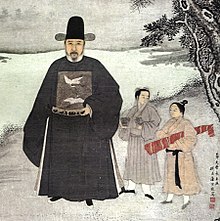Scholar-official

Scholar-officials, also known as Literati, Scholar-gentlemen, Scholar-bureaucrats or Scholar-gentry (Chinese: 士大夫; pinyin: shì dàfū) were civil servants appointed by the emperor of China to perform day-to-day governance from the Han dynasty to the end of the Qing dynasty in 1912, China's last imperial dynasty. After the Sui dynasty these officials mostly came from the scholar-gentry (紳士 shēnshì) who had earned academic degrees (such as xiucai, juren, or jinshi) by passing the imperial examinations. The scholar-officials were schooled in calligraphy and Confucian texts. They dominated the government and local life of China until the middle of the 20th century. Historian Charles Moore concludes that:
- Generally speaking, the record of these scholar-gentlemen has been a worthy one. It was good enough to be praised and imitated in 18th century Europe. Nevertheless, it has given China a tremendous handicap in their transition from government by men to government by law, and personal considerations in Chinese government have been a curse.[1]
Since only a few could become court or local officials, the majority of the scholar-gentry stayed in villages or cities as social leaders. The scholar-gentry carried out social welfare measures, taught in private schools, helped negotiate minor legal disputes, supervised community projects, maintained local law and order, conducted Confucian ceremonies, assisted in the government's collection of taxes, and preached Confucian moral teachings. As a class, these scholars claimed to represent morality and virtue. The district magistrate, who by regulation was not allowed to serve in his home district, depended on local gentry for advice and for carrying out projects, giving them power to benefit themselves and their clients.
See also
References and further reading
- Elman, Benjamin A. (2009), "Civil Service Examinations (Keju)", Berkshire Encyclopedia of China (PDF), Great Barrington, MA: Berkshire, pp. 405–410
{{citation}}: Cite has empty unknown parameter:|editor-last, ed.=(help) - Esherick, Joseph and Mary Backus Rankin (1990). Chinese Local Elites and Patterns of Dominance. Berkeley: University of California Press. ISBN 0520067630.. Free online text.
- Max Weber, The Religion of China: Confucianism and Taoism (1916; transl. 1951)
- Jerry Bentley and Herb Ziegler. Traditions and Encounters - A Global Perspective on the Past.
- Zhang, Zhongli (1955). The Chinese Gentry; Studies on Their Role in Nineteenth-Century Chinese Society. Seattle,: University of Washington Press.
{{cite book}}: CS1 maint: extra punctuation (link)
Notes
- ^ Charles Alexander Moore (1967). The Chinese Mind: Essentials of Chinese Philosophy and Culture. U of Hawaii Press. p. 22.
External links
- Late Qing China: Reform and Rebellion (1898 -1900)
- Reunification and Renaissance in Chinese Civilization: The Era of the Tang and Song Dynasties
- The Chinese Scholar-Official Education About Asia, Columbia University.
